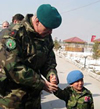Number 40 | April 21, 2008
The following article was published in the German magazine “Bild” on April 18, 2008 by Andreas Leixering, translated into English by Nancy Joyce for Deutsche Welle.
China’s Battle Against the Uighurs
”The way China is treating the Tibetan uprising has outraged the West. The suffering of the Uighurs, on the other hand, receives little attention. Beijing defends the suppression of the Muslim minority as fighting terrorism.
The Chinese state is simmering. In the run-up to the Olympic Games, not only the Tibetans are rebelling but now the Uighurs in the northwest Chinese province Xinjiang. Only recently did the US Sender "Radio Free Asia" report that hundreds of people in the city of Hetjan took to the streets on March 23.
According to the report, the catalyst was the death of a Uighur businessman who, say officials, died of a heart attack while detained by the Chinese. Eye witnesses report that hundreds were arrested. The city government, on the other hand, talks about the thwarted "conspiracy" of a "small group of agitators." At the beginning of March, according to reports from Uighur exiles, another 70 persons were arrested by the Chinese police. On April 4, 2008, a group of Muslim Uighurs protested at the Olympic torch relay in Istanbul against religious and political repression by Beijing.
East Turkestan became Xinjiang
As a result of such actions many Westerners are now hearing about this internal Chinese conflict for the first time. The Uighurs, a Muslim Turkic people, have suffered from systematic repression at least since the 1990s. As with Tibet, in 1949 Mao annexed the formerly autonomous East Turkestan. Since 1955 the province – an area of the size of Western Europe – has been called Xinjiang. And like Tibet, the region has autonomous status on paper. But the reality for the eight million Uighurs living there looks very different.
Political, economic, religious repression
"There is no other ethnic group in the People's Republic of China that is subject to such harsh persecution," claims Ulrich Delius, Asia specialist with the German Society for Endangered Peoples (GfbV) in Göttingen. According to its figures, the government has carried out more than 500 death sentences in the region since 1997. Delius points out that, without wanting to compare the situation, one should note that only two people have been executed in Tibet during the same period of time.
Han Chinese are being systematically settled in Xinjiang. An estimated 1,000 of them arrive every day. Today the proportion of Uighurs in the population has fallen from 93 to just 47 percent. The exile organization East Turkestan Union in Europe has even received reports about the forced sterilization of Uighur women. The practice of their religion, according to Amnesty International, has been sabotaged: mosques have been arbitrarily closed, religious festivals forbidden, and the language of the Uighurs banned in schools.
Fear of secession
It is mainly for economic reasons that the Uighurs are being repressed so harshly, explains Delius: "In the past few years Xinjiang has become the most important crude oil and natural gas provider in the People's Republic." Moreover, the province is strategically relevant. The Xinjiang province borders on former Soviet republics such as Kyrgyzstan, Turkmenistan and Kazakhstan, in which other Turkic peoples like the Uighurs live and which are now independent. "China is very afraid that the secession fever could jump over the border and the Uighurs could start demanding independence in their own country."
Between the suspicion of terrorism and the desire for independence
Since September 11, 2001, China has used the fact that the Uighurs are Muslims to legitimize its policy of using brute force against the minority as defense against terrorists. The country has received outside support in doing so. In the same year as the attack on New York the UN placed the East Turkestan Islamic Movement (ETIM) on its list of terrorist organizations.
Yet the group has fewer than 500 members. It is not even clear if it still exists. In the 1990s a few Uighurs visited terrorist camps in Afghanistan. Twenty-two of them landed in the US Guantánamo prison, but some of them have since been released. They were apparently merely at the wrong place at the wrong time. Erkin Zunun from the East Turkestan Union in Europe dismisses the accusations of terrorism. He considers a purportedly thwarted terrorist attack in the run-up to the Olympic Games that took place in an airplane flying from Urumqi to Beijing as a Chinese fabrication. "We are not radical Muslims," says the Secretary General of the Munich-based organization reassuringly and laughs: "After all, 80 percent of Uighur men drink alcohol." According to Ulrich Delius, the majority of Uighurs engage in peaceful resistance.
Will the Olympic torch bring light to the Uighurs?
Following the uprising in Tibet a few months before the Olympic Games Beijing has increased the pressure on the Uighurs. "Friends have told me that the police are dispersing even groups of three people," says Ekin Zunun. And a curfew has been imposed after 10 at night. He believes that the Uighurs are waiting for the Olympic Games before they unleash their protest. Right now it is impossible.”

























